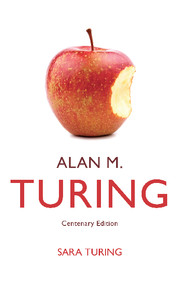Book contents
- Frontmatter
- Contents
- Foreword to the Centenary Edition
- Preface to the First Edition
- Foreword to the First Edition
- Part One Mainly Biographical
- 1 Family Background
- 2 Childhood and Early Boyhood
- 3 At Sherborne School
- 4 At Cambridge
- 5 At the Graduate College, Princeton
- 6 Some Characteristics
- 7 War Work in the Foreign Office
- 8 At the National Physical Laboratory, Teddington
- 9 Work with the Manchester Automatic Digital Machine
- 10 Broadcasts and Intelligent Machinery
- 11 Morphogenesis
- 12 Relaxation
- 13 Last Days and Some Tributes
- Part Two Concerning Computing Machinery and Morphogenesis
- My Brother Alan
- Bibliography
10 - Broadcasts and Intelligent Machinery
Published online by Cambridge University Press: 05 April 2012
- Frontmatter
- Contents
- Foreword to the Centenary Edition
- Preface to the First Edition
- Foreword to the First Edition
- Part One Mainly Biographical
- 1 Family Background
- 2 Childhood and Early Boyhood
- 3 At Sherborne School
- 4 At Cambridge
- 5 At the Graduate College, Princeton
- 6 Some Characteristics
- 7 War Work in the Foreign Office
- 8 At the National Physical Laboratory, Teddington
- 9 Work with the Manchester Automatic Digital Machine
- 10 Broadcasts and Intelligent Machinery
- 11 Morphogenesis
- 12 Relaxation
- 13 Last Days and Some Tributes
- Part Two Concerning Computing Machinery and Morphogenesis
- My Brother Alan
- Bibliography
Summary
On 15th May, 1951, on the Third Programme, Alan gave his first broadcast, which was one of a series with the general title “Automatic Calculating Machines.” His lecture, the second in the series, bore the sub-title, “Can Digital Computers Think?” I heard at his house its recording, but he stoutly refused to join me, though he plucked up courage to listen to its repetition on 3rd July, 1951. It was, as far as I know, generally agreed that he put his case very clearly. The other participants in the series were: Professor M.H.A. Newman, F.R.S.; Professor F.C. Williams, F.R.S.; and Mr. M.V. Wilkes (later F.R.S.), who gave no sub-title to their lectures. These talks were all reasonably long, not those very short affairs that stop just as one is beginning to get interested.
These lectures were followed on 14th January, 1952, by a fourcornered broadcast discussion on the Third Programme between Professor Sir Geoffrey Jefferson, F.R.S., Professor M.H.A. Newman, F.R.S., Mr. R.B. Braithwaite, Fellow of King's College, Cambridge, and Alan. The subject was, “Can Automatic Calculating Machines be said to Think?” Alan vigorously maintained, with some mild support from Professor Newman, that they could be said to think and bore the brunt of their opponents' objections, particularly those of Sir Geoffrey Jefferson. The general impression of my non-expert friends was that the subject had been presented most amusingly and in such a way as to be, on the whole, within the comprehension of those to whom it was quite new.
- Type
- Chapter
- Information
- Alan M. TuringCentenary Edition, pp. 100 - 101Publisher: Cambridge University PressPrint publication year: 2012



